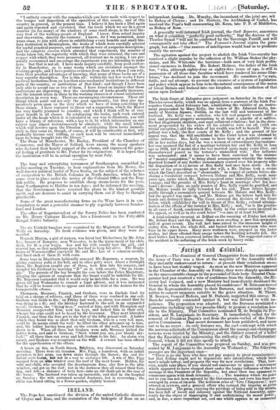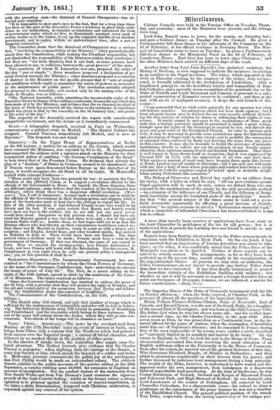c farttgu nuh CnIuntal.
FRANCE.—The dismissal of General Changarnier from his command of the Army of Paris was a blow at the majority of the Assembli winch they instantly ;endeavoured to return : ;- at present their :retaliation ',Seems to have teen but Waged, As pion as the-now'Miiiiiteris appeared in the Chamber of the Asgembly on Friday, they were ihruplrquestioned on thennfiecoimtable change in the Personnel of their body: General; Chan- garnier had just received Itched confidence frelm.the Assembly, the Mi- nistry had resigned, and-a ; new Ministry had immediately: dismissed the General in whom the Assembly placeffitseonfideneel: M.:Ronineatineved that the RepresentatiVes retire to their BuMaux; and nominate*-'Com- mittee to concert melanins suitable to the grave situation. MAliers, M. Berryer, General Redeau, and M. Dufaure, supported this coirrsc; M. Baroche earnestly contended 'against it, but was listened to With im- to have teen but Waged, As pion as the-now'Miiiiiteris appeared in the Chamber of the Asgembly on Friday, they were ihruplrquestioned on thennfiecoimtable change in the Personnel of their body: General; Chan- garnier had just received Itched confidence frelm.the Assembly, the Mi- nistry had resigned, and-a ; new Ministry had immediately: dismissed the General in whom the Assembly placeffitseonfideneel: M.:Ronineatineved that the RepresentatiVes retire to their BuMaux; and nominate*-'Com- mittee to concert melanins suitable to the grave situation. MAliers, M. Berryer, General Redeau, and M. Dufaure, supported this coirrsc; M. Baroche earnestly contended 'against it, but was listened to With im- patience. The proposition was adopted ; and the nominated a Committee including Only two persons likely to propose a resolutionlios- tile to the Ministry„, :That Committee nomineted Al. de Broglie Ili-Pre- sident, and M. Lamjhtvyr}ia its Secretary. It immediately called for the removal of :Presidentilitpin's seal from the procba-rerbal of the Proro- gation Commission. ,..That secret document has been:publishedrAnd turns out to be no secret : .itsonly features are, the cool contempt with which the nervous soli itpd jof the Commission about the sausage and champagne reviews were ti;e dpT:. the Ministry, and the distinct avowal of a belief that the Exeentiy 'as underminingthe authority of the Parliamentary General, Whoni # ,riet dare openly to atteck.
The repork', of; e Pommittee u•es prepared on Sunday, and was.pre-
seated by itt',1441410is to the Assembly On Wednesday. The following , passages arc theireportent ones— "There is no one'. 'here who does not pay respect to great reminiseenees_; but that feeling' Might not to dc,gcnerate into intoxication, which leads men's minds astiny:.; aria inepares the way for new revolutions. That, how- ever; might takepNee,if yet should not endeavour to oppose; anakivernent which appeared 'whew+ 93totipcid short under the happyinfluence or the last message of Ihe2resident of the Republic, but since .then has -appearedlo commence.againWith fresh intbusity. . . . . The tendency which:We.point out to yorehas-notebeeneppoeedby the Oovernmeet,. and even hAri.been en- courage4y,eorrie,ofiteache The seditious cries of 'Vire rEetperettsl' were uttered at reviews,aed-la geecial officer who resisted the impulse so giern was dismissed. The prose .enjoying theprieilege of being sold in the streets, has been full of ' insult and calumny against the National Assembly, appa- rently for the object of disparaging it end undermining its moral power ; and, in fine, a more important act, and one which appears to us connected
with the preceding ones—the dismissal of General Changarnier—has at- tracted your attention. "It is impossible to shut one's eyes to the fact, that fora long time there has been on the part of the Executive Power a tendency to place little confi- dence in our institutions, to consider as transitory and ephemeral the form of government under which we live, to disseminate amongst every rank of society doubts as to the future, to cry up the supposed benefits of an absolute government, and to aspire, within an endetefmined time, after a sort of Imperial restoration." The Committee deem that the diemiSsal Of Clitnigarnier was a serious fact, " involving the responsibility of the Ministry," [they parenthetically assert that the Constitution, .while making the President .responsible has not diminished the responsibility of his Ministersatithin their attributes;] l] but they are " far from thinking that it can lead, as Some persons have been pleased to say, to collisions between the great. powers" of the state.
Two members, of whom.M. Lamartine was one, proposed the order of the day "pur et simple" ; three members proposed a declaration of ge- neral distrust towards the Ministry; other membersproposed a resolution of distrust in the Ministry on the specific ground that it " sets at nought the conditions which ought to guarantee the Milieu of powers so necessary to the maintenance of public peace." The. resolution actually adopted for proposal to the Assembly, and carried only by the casting-vote of the Duke de Broglie, was as follows—
"The National Miserably, while admitting the incontestable right of the Executive Power to dispose of the military commands, blames the use which has been made of it by the Ministry, and declares that the ex General-in-chief of the Army of Paris has preserved all his claims to the testimony of confidence which was given to him by the Assembly cm the 3d January last; and passes to the order of the day."
The majority of the Assembly received the report with considerable sympathetic excitement, and the debate on it immediately commenced.
Snanc.—A telegraphic despatch, received in Paris on Wednesday, communicates a political crisis in Madrid. "The Madrid Cabinet has resigned. General Narvaez immediately left Madrid, and is now at Bayonne?' The despatch was not dated. .
. Getimixv. --in the Upper House of Representatives at Berlin on the 8th instant, a motion for an address to the Crown, which would have censured-the Ministers, was rejected by 92 to 35. M. Camphausen bad aupported the address with a vigorous attack on the Ministry for their transparent poliey of enabling " the.Germasi Constitaition of the Bund" to bear down that of the Prussian Union. He declared, that already the plan of a "dualism" of States in Germany seemed to be abandoned; and if Prussia were again denounced before Europe as the disturber of its peace, it would recognize the old Burid in all its rights. M. Manteuffel replied with extreme frankness- " There could only have 'been two grounds for war : to maintain the Con- stitution of the [Erfurt] Union, or to support a revolution effected by the officials of the Government in Hesse. As regards the Hesse disputes, there are different opinions ; some believe that the conduct of the Government was arbitrary, others think there was a dangerous official revolution. (Mur- murs.):Yes, I call it dangerous; because such a resolution can be made by the officials of the Government in their dressing-gowns and slippers, while a man of the barricades must at least haVe the courage to expose his life. In face of the other question, it had behoved Prussia to see who would be its friends and its foes. It was quite certain that Russia and Austria would have been our foes iu the conflict; but by our side not one great power would have stood. Dangerous as this position iyas, I should not have ad- vised his Majesty against a war, but that there were only a few of the small German States with us : besides them,we had hopes held out to ns that the Hessian officers who had thrown up their commissions would have joined us ; then there was M. Mazzini in Geneva, ready to assist us with a money sub- scription and Kleplca, Arnold Ruge, and other kindred spirits, had arrived in Holstein to help us. These would have been our friends. The time arrived when a decision' must be made Prussia '"must have a voice in the government of Germany. If that was atained,-the cause of war ceased to exist. Here we reached the Aurning-poiut; here Prussia determined to break, and here Prussia. will break with the Revolution. For this reason, M. Camphausen is very right when he calls, our present policy a transparent one ; yes, in tlds question it shall be so
Senteswia-Houcreuv.—The Insurrectionary' Government has suc- cumbed to " the.Commissioners bywhora the/Great Powers of 'Germany, in the name of the Germanic Ocefederatioti, inkie,rindertaken to execute theAreaty of. peace. of July 241.". The Diet,adne;;secret sitting on the night.of, the 10th instant,. agreed :to abide hy the seaolution of the Coun- ciliof -Ministers: The latter,resolvedris
"Since theGermanic.Oonfederation. has'inaselved .te enforce the peace of the2d Tiity,, with a promise that they will 'peetect the,right of Holstein and the old and vested .right of the cennexion :..tweeis. that Duchy and Schles- wig?' the Stadtholdcrs decree the cessation Of***Iities." The Commissioners of the Confederation on ,the 11th, proclaimed as follows- : "The Danish army will retreat, and only that number of troops which is sufficient for the maintenance of triifieuillity miff eider will be left in Schles- wig. The Schleswig-Holstein aYniywlll remain In possession of ltendsburg and Friedrichsort, and the territth.ke Which belong to these fortresses. The rest of the army will retrentirehreif *h the Evder,' ere they will go into can- tonments. Two-thirds of tike trospa will'be disiniiied on leave."
INDIA : CHINA : AtisrMA news by`the. overland mail from Bombay on the 17th Dec "*Vsnitevent of interest in India, and brings from China onlY )4r th4(`4.10.,Southern rebels had gained a fresh success over the If dal' cps ; raticcess of trivial character, and
followed by no marked a'he in the posh on of either party.
In the absence of Mita ' news, the AtfAi • n files supply. some Co-
lonial gleanings. The ydriCY 'ournalsl dridence that Sir Charles
FitzroyieimpoRnlar : whcig Ong s carriage at the theatre, a stem W4 thrown at him, lancli in wk astkikonet of a soldier and broke it l lbonine journals ,eimnpuniscate the Talk joy at the intelligence that Port Phillip would be:made an ianeRendent colony. The Adelaide Gazette exhibits in the publio accounts of,Itheluarter ending on the 30th September, a surplus yielding some 40,000L. for remission to England on account immigration. But the marked feature of the statements from New South fWales and from Van Diemen's Land concern the vigorous growth 'Of the Anti-Convict feeling : whilit in the former colony a strong agitation is in progress against the cessation of donviet-importation, in the latter a stern determination, tempered with Christian moderation, is expresseff against any renewal of the system.



























 Previous page
Previous page